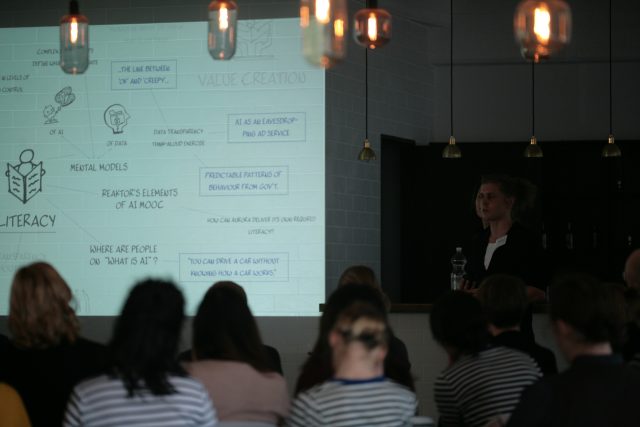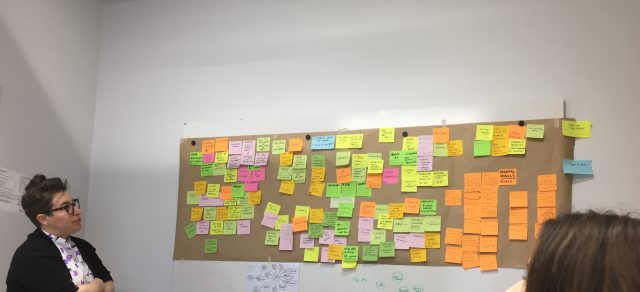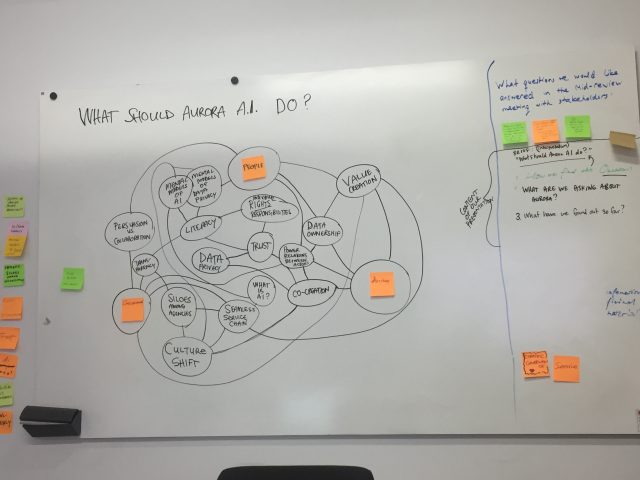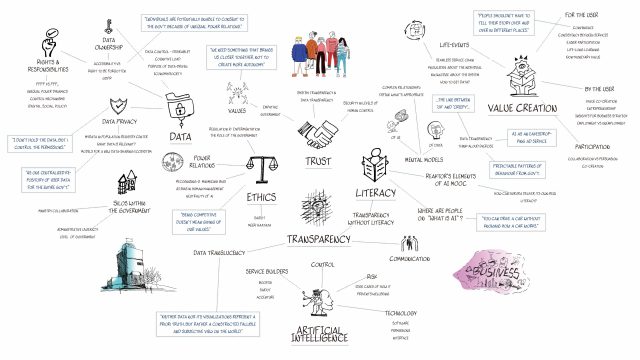This blog post reports on work-in-progress within the DfG course! The post is written by one of the two groups dealing with the Ministry of Finance’s brief on ‘Aurora AI: Empowering Citizens through Artificial Intelligence.’ The group includes Mia Aintila from the Language Specialist Program (English) at University of Turku, He Dian and Mirko Wittka from Aalto’s Creative Sustainability program, and Molly Balcom Raleigh from Aalto’s Collaborative and Industrial Design program.
We’re on the brink of another new digital era, in which everyone from small retailers to entire governments are using artificial intelligence (algorithms and machine learning) to provide better services for their customers and constituents. These services are part of what is called a “data economy” — a digital ecosystem in which data is gathered, organized, and exchanged by a network of vendors to create new value. To harness the potential power of artificial intelligence to create better services for its citizens, the Finnish Government has launched a project called Aurora AI. In this context, the Ministry of Finance has asked Design for Government students to consider how citizens can be empowered to better control their own wellbeing through artificial intelligence.
Our project aims to understand the digital and social environments that Aurora AI is going to work in, and imagine how an AI-enabled data economy might support the wellbeing of people who participate in it.

Opening Up the Brief
To begin, we opened up the brief by researching the Aurora AI project as a whole, and summarizing our stakeholders’ goals for Aurora AI:
- First, to provide a life-event-triggered seamless service-chain that enables people to exert more control over their own data;
- Second, to create a regulatory structure for an emerging data economy, allowing new business opportunities while protecting individual’s data ownership and privacy;
- Third, to catalyze a culture-shift in the public service sector and civil society towards trust and engagement in artificial intelligence.


With such a broad brief and a rapidly expanding subject area we needed a plan to manage the immense scope. We loosely organized our research into streams: Data Literacy, Ethics and Trust, What is AI?, Value Creation and Participation. We created a “rich picture” of Aurora AI through expert interviews, literature review, and a modified “think aloud” user test to understand people’s mental models of data transparency.

Insights and Next Steps
Through our research we found that Aurora AI’s development requires more attention to users’ perspectives. New EU data privacy laws give individuals extensive rights regarding their own data, but there is a gap in how people understand these rights, as recent research by Sitra’s IHAN project shows. Unless thoughtfully implemented, AI can potentially widen this gap by making how services work even less transparent to users. Controlling your own data also means being responsible for your own data but what exactly will be entailed by that responsibility— and its implications for people’s daily lives — will depend on the regulations and system infrastructure being built right now. These new ways of thinking about personal data are fuzzy and emerging, both for the general public and also for the experts working on AI-enabled services. We see this as a potential risk to Aurora AI, but it also presents an interesting set of challenges for our project to address.
The Finnish government is not alone in its goal of providing AI-enabled services, and there are many other projects in the EU and abroad to learn from. All of these projects are asking how AI can increase value creation, but only a few such as DECODE are asking how data and AI projects can increase citizen (human) wellbeing. Central to this goal is understanding what futures people want to be brought forth through an AI-enabled data economy.
Our project’s next steps flow from these questions: How can we bring to life a vision of Aurora AI as a platform for collaboration and empowerment? How can we center people in an AI-enabled data economy? If we imagine that social cohesion — the resilience that people derive from strong relationships — is part of wellbeing in a data economy, what kinds of relationships or resources will people need to participate effectively? And who might be missing from the current Aurora AI development community to make this vision real?
The DfG course runs for 14 weeks each spring – the 2019 course has now started and runs 26 Feb to 21 May. It’s an advanced studio course in which students work in multidisciplinary teams to address project briefs commissioned by governmental ministries in Finland. The course proceeds through the spring as a series of teaching modules in which various research and design methods are applied to addressing the project briefs. Blog posts are written by student groups, in which they share news, experiences and insights from within the course activities and their project development. More information here about the DfG 2019 project briefs. Hold the date for the public finale 09:00-12:00 on Tuesday 21 May!
